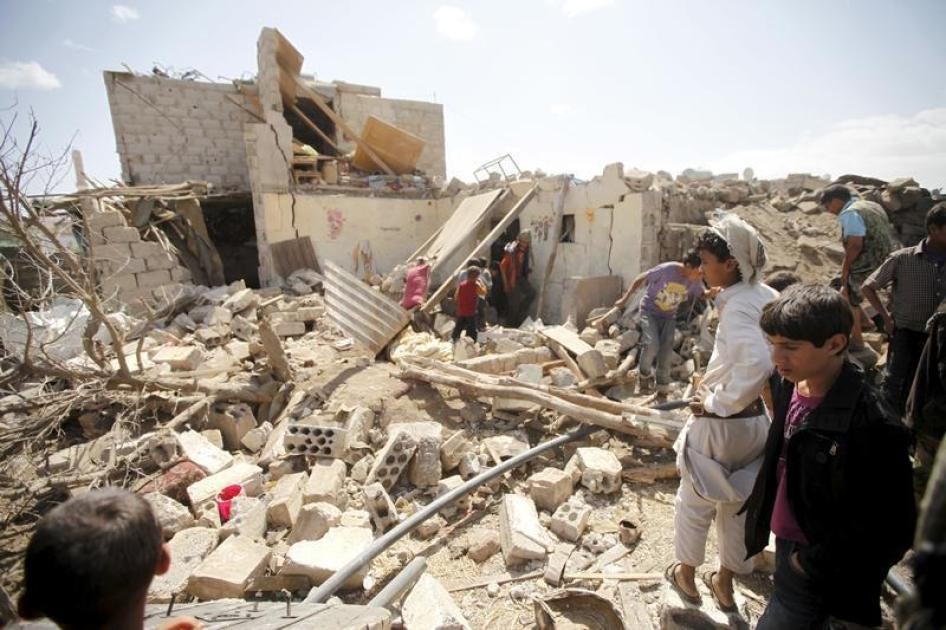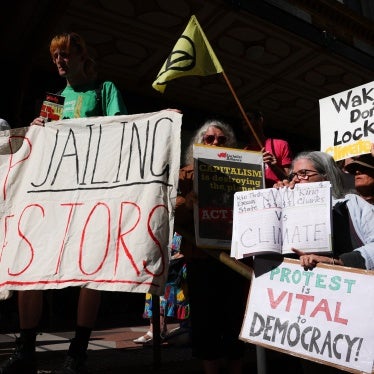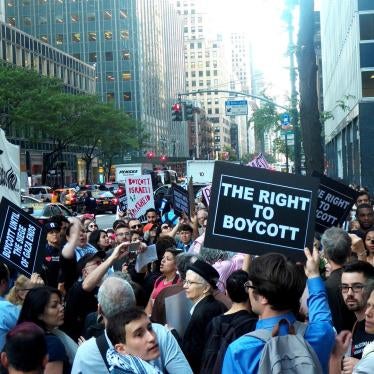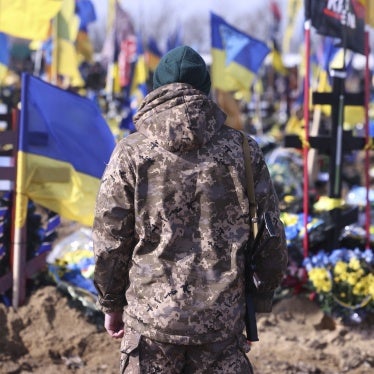Why is Human Rights Watch calling for an arms embargo on Saudi Arabia?
Human Rights Watch’s call for suspending all weapons sales to Saudi Arabia comes after a year of documenting numerous unlawful airstrikes by the Saudi-led coalition in Yemen that have taken a devastating toll on civilians. Instead of initiating investigations into alleged unlawful airstrikes as required by international humanitarian law, Saudi Arabia has consistently denied or minimized violations and obstructed international efforts to establish the facts. Of the more than 3,200 Yemeni civilians killed in the past year’s fighting, the United Nations estimates that the majority were caused by coalition bombing.
Human Rights Watch alone has documented 36 unlawful coalition airstrikes that have killed more than 550 civilians, including in markets, hospitals, and residential areas. These strikes either did not discriminate between civilians or combatants, or caused disproportionate civilian harm. Saudi Arabia also continues to use cluster munitions, which are indiscriminate weapons that pose long-term dangers to civilians. They are prohibited by the 2008 Convention on Cluster Munitions adopted by 118 countries, though not Saudi Arabia or Yemen.
By calling for a full arms embargo against Saudi Arabia, Human Rights Watch seeks to deprive Saudi Arabia of the means to commit further laws-of-war violations in Yemen.
Why is Human Rights Watch only calling for an arms embargo against the Saudis when there are a coalition of nine countries involved in the Yemen conflict?
Saudi Arabia is the leading member of the coalition, the command control structure of the military campaign is in the Saudi capital, Riyadh, and Saudi warplanes have played a predominant role in the campaign.
Information on the role of other coalition members in the airstrikes is limited. However, should more information become available on the role of other parties to the conflict, Human Rights Watch could expand its call for an embargo. In addition, Human Rights Watch would also oppose the sale or provision of weapons to other coalition members that are likely to be used in unlawful attacks or are banned, such as cluster munitions or anti-personnel landmines.
Has Human Rights Watch called for arms embargoes against other countries?
Human Rights Watch will call for bans on sales or provision of specific weapons that are likely to be used unlawfully during an armed conflict or are generally banned. We have called for full arms embargoes in situations where a party to the conflict has carried out unlawful attacks in a systematic manner or carried out numerous unlawful attacks over a wide area or long period of time, and has taken inadequate steps to investigate and appropriately punish such attacks – indicating an intention to carry out further unlawful attacks in the future. In recent years we have called for suspension of weapon sales and transfers to parties to the armed conflicts in South Sudan, Syria, and Israel/Palestine.
Is Human Rights Watch calling for a ban on weapons to the Houthis?
Human Rights Watch supports a ban on the sale or provision of weapons to the Houthis—also known as Ansar Allah—that are likely to be used unlawfully, notably unguided “Grad-type” rockets and anti-personnel landmines.
Why is Human Rights Watch calling for an arms embargo when the Yemeni government and Saudi Arabia have said they are investigating allegations of human rights violations?
There is no evidence that either Saudi Arabia or the Yemeni government are conducting credible and impartial investigations into alleged laws-of-war violations by coalition forces. And there have been no reports of any disciplinary or criminal actions being taken against coalition personnel for their role in unlawful airstrikes. As noted in our news release, the coalition military spokesman stated on January 31, 2016, that Saudi’s new committee to assess the coalition’s rules of engagement “is not to investigate allegations” but “to confirm the precision of the procedures followed on the level of the coalition command.”
Meanwhile, airstrikes killing civilians have continued: on March 16, at least 78 civilians were killed and more than 100 injured when three Saudi airstrikes hit a market in northern Yemen, according to media reports.
Instead of imposing an arms embargo, shouldn’t the US, UK and France be selling Saudi Arabia more accurate weapons to limit civilian casualties in Yemen?
Merely possessing more accurate weaponry does not ensure that weapons won’t be used in violation of the laws of war. Saudi Arabia already has high tech weapons in their arsenal and has used them in the fighting in Yemen. In addition, many of the unlawful airstrikes investigated by Human Rights Watch do not appear to have occurred because the weaponry used missed a valid military target and wrongly struck civilians – bombs often hit areas where there was no apparent military objective and no likely military targets nearby.
How do we know that the cluster munitions and other weapon remnants Human Rights Watch researchers have documented in Yemen are genuine and have not been planted?
Human Rights Watch researchers in Yemen collected evidence, including witness accounts, still photographs, videos, satellite images, and geo-spatial data, in the course of on-the-ground field investigations and remotely in areas where the risk of on-site visits was too great. The materials were analyzed and compared with evidence from a number of other sources including Amnesty International, international journalists, and by individual Yemeni citizens. This analysis included confirmation of the validity of the embedded metadata in images and video footage and geo-location of each location. Human Rights Watch also verified the identification of munitions and explosive remnants of war with independent international demining experts and armament research specialists. Using this methodology, Human Rights Watch has been able to alert the international community to the threat posed, for example, by unsecured weapons depots in Libya, the use of chemical weapons in Syria, and the widespread use of cluster munitions in the conflict in eastern Ukraine.
Since March 2015, Human Rights Watch has recorded incidents involving six types of air-dropped and ground-launched cluster munitions in multiple locations in at least five of Yemen’s 21 governorates: Amran, Hajja, Hodaida, Saada, and Sanaa. These cluster munitions were produced mostly in the United States, but also include a cluster munition produced and exported by Brazil. These weapons included the newest type of cluster munition made in the US, which has never been used in combat, as well as cluster munitions made in the 1970 and 1980s. There is little probability that a group currently operating in northern Yemen, such as the Houthis, could obtain, transport, and display such a diversity of armed unexploded submunitions and remnants of their distinct delivery systems at such geographically separated locations.
What weapons sold by foreign countries have you documented being involved in unlawful airstrikes in Yemen?
On-the-ground investigations by Human Rights Watch researchers have documented the use of unguided air-dropped bombs, guided bombs such as Paveway-series laser guided, JDAM satellite guided including the BLU-109 “bunker buster” version, and a variety of types of cluster munitions. These weapons were produced and exported by the United States and a number of European countries including France, Italy, Spain, and the United Kingdom. In addition to these munitions, these same countries have sold attack aircraft such as ground-attack jet and helicopters that deliver these weapons to Saudi Arabia.







